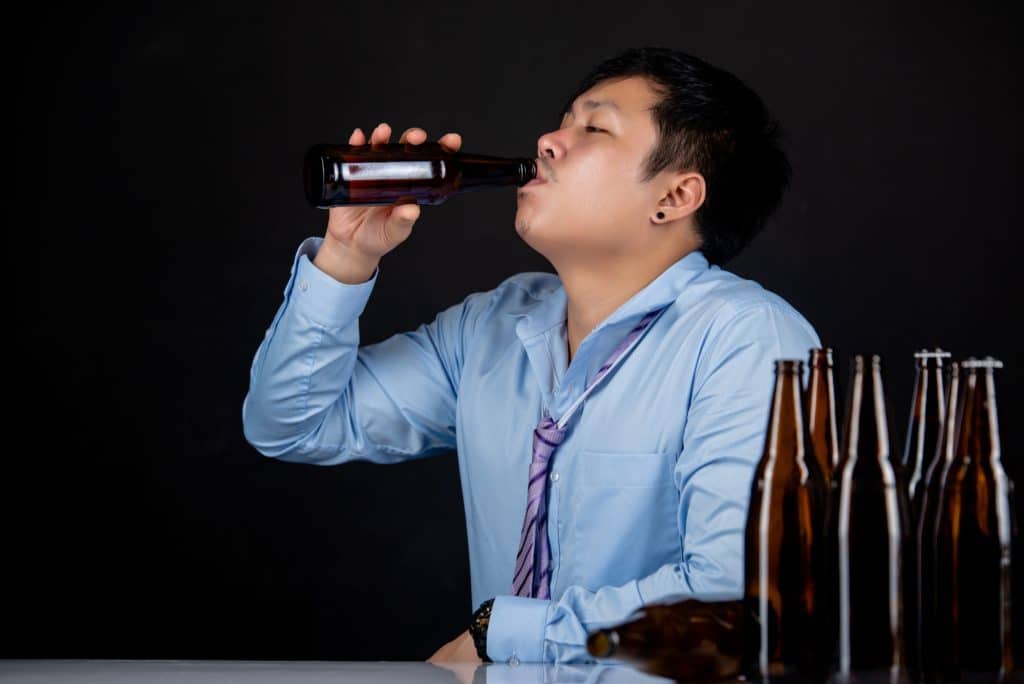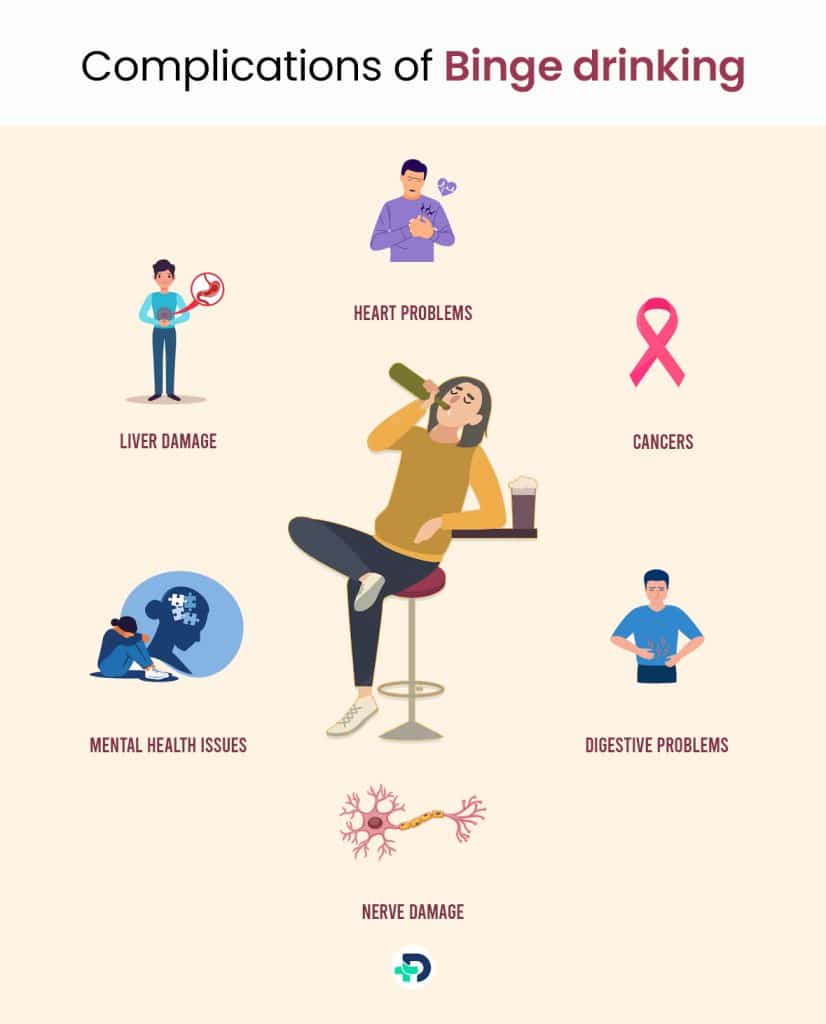What is Binge drinking: Causes, Complications and Treatment

- Binge Drinking
- 22 Aug 2023
Overview
What is Binge drinking?
Binge drinking is when a person consumes excessive alcohol in a short period, resulting in a blood alcohol concentration of 0.08 grams or more.1Overview| Researched based study from Niaaa.nih.gov For men, binge drinking usually involves downing at least five alcoholic drinks in around two hours.2Overview| Researched based study from Niaaa.nih.gov For women, it is briefly drinking four or more drinks. However, this may vary depending on a person’s height, body type, metabolism, etc. This article discusses binge drinking, including its causes, risk factors, short- and long-term complications, how to get help and the treatment options for those struggling with this problem.

Binge drinking facts
- Binge drinking is a worldwide problem affecting people of all ages and socioeconomic backgrounds.
- Grave health hazards are associated with binge drinking, a widespread and dangerous pattern of alcohol use.
- Six percent of US adults binge drink, and at least one in four people binge drink once every week.7Overview| Researched based study from Drugfreeworld.org
- A large majority of those who binge drink do not have alcohol dependence.3Overview| Researched based study from Cdc.gov
- Alcohol toxicity, which can cause death, can result from binge drinking.4Overview| Researched based study from Cdc.gov
Causes
Causes and risk factors
The following are a few typical causes and risk factors for the rise of binge drinking behavior:
- Genetic factors – A person’s susceptibility to alcohol’s rewarding effects and the likelihood of binge drinking may be increased by specific genetic variants.
- Family history – Being exposed to alcohol misuse or addiction as a child can make it more likely that one will engage in binge drinking.
- Age – Early alcohol consumption, especially throughout adolescence, increases the likelihood of Binge drinking behavior in individuals. They frequently lack the wisdom, experience, and information to drink sensibly.5Causes| Researched based study from Niaaa.nih.gov
- Gender – Men are more likely to binge drink than women.3Causes| Researched based study from Cdc.gov
- Social and peer pressure – To blend in with their social group or adapt to their peers’ perceived standards, people may engage in excessive drinking.5Causes| Researched based study from Niaaa.nih.gov
- Mental health disorders – There is a higher risk of binge drinking when there are co-occurring mental health conditions such as anxiety, depression, or personality disorders. Some people may self-medicate with alcohol to temporarily reduce their symptoms.6Causes| Researched based study from Nlm.nih.gov
- Alcohol availability and accessibility – are factors that can lead to binge drinking. Individuals having better access to alcohol, such as college-aged students or those with a large amount of disposable income, may be more prone to binge drinking.
- Low self-esteem – Binge drinking may become a coping mechanism for those who lack confidence or have a negative perception of their bodies, helping them to feel more at ease in social settings.
Understanding these elements can assist people, their families, and their communities to prevent or treat binge drinking practices and encourage healthy lifestyle choices.
Complications

What complications arise due to Binge drinking?
Short-term complications
Engaging in binge drinking poses several immediate risks including
- Headaches
- Confusion
- Distorted vision 7Complications| Researched based study from Drugfreeworld.org
- Vomiting & diarrhea
- Slowed breathing
- Impaired judgment
- Poor coordination
- Hearing problem
- Unconsciousness
- Slurred speech
- Dehydration
- Drowsiness
- Memory loss
- Mood swings
- Seizures
- Coma
- Death
Long-term complications
Beyond the immediate risks, routine binge drinking may have permanent effects on a person’s physical and mental well-being, which may include:
- Liver damage – like alcoholic hepatitis, fatty liver disease, and cirrhosis.
- Heart problems – like high blood pressure, irregular heart rhythms, and long-term heart damage like stroke.
- Mental health issues – like anxiety, depression can increase the risk of developing alcohol use disorder.2Complications| Researched based study from Niaaa.nih.gov
- Nerve damage – permanent damage to the brain is possible, especially in young people who binge drink during their growth phase.8Complications| Researched based study from Rochester.edu
- Social problems – like poverty, unemployment, homelessness, sexual issues, divorce, or broken relationships.
- Physical injuries – from workplace injuries, falls, road traffic accidents, drowning, burns, etc.
- Digestive problems – like ulcers, malnutrition, and gastritis.7Complications| Researched based study from Drugfreeworld.org
- Deficiencies – like anemia and vitamin B1 deficiency.
- Cancers – of the mouth, throat, breast, colon, pancreas, liver, and stomach.9Complications| Researched based study from Cdc.gov
- Alcohol poisoning – may show mental confusion, vomiting, seizures, slow breathing, cold and clammy skin, irregular breathing, paleness, slow heart rate, slow or dull reflexes, and inability to wake up.10Complications| Researched based study from Niaaa.nih.gov
- Indulge in crimes – like sexual assault, murder, or domestic violence.
- In pregnant women – poor pregnancy outcomes, including miscarriage, stillbirth, fetal alcohol spectrum disorder, or sudden infant death. 3Complications| Researched based study from Cdc.gov
Prevention
Tips to prevent Binge drinking
- Set clear limits – Define your boundaries with alcohol use by setting a limit on the number of drinks you feel comfortable having at a time, and don’t go over it.
- Pace yourself – When consuming alcohol, take it slowly and avoid gulping down beverages quickly or participating in drinking activities that promote gulping. Instead, take your time and enjoy your beverages.
- Alternate alcoholic and non-alcoholic beverages – as a result, you’ll drink less alcohol overall, stay hydrated, and pace yourself.
- Avoid drinking games – Drinking games frequently encourage rapid and excessive alcohol consumption. If you wish to avoid binge drinking, staying away from such activities is preferable.11Prevention| Researched based study from Alcoholsproblemsandsolutions.org
- Beware of peer pressure – Observe how it affects your drinking behavior and be aware of it. Get close to people who accept your boundaries and your alcohol consumption choices.
- Find substitute activities – that don’t involve drinking. Look for leisure activities or social gatherings that encourage a fun and fulfilling lifestyle without excessive alcohol usage.
- Plan and set goals – Before leaving home, plan and set some goals for yourself. Decide how many drinks you can comfortably consume, then stick to it.12Prevention| Researched based study from Medlineplus.gov
- Knowing your triggers – will help you create healthy coping mechanisms, such as engaging in stress-relieving activities or getting help from friends.12Prevention| Researched based study from Medlineplus.gov
- Seek support – if you’re struggling to stop binge drinking. Discuss your worries with a dependable family member, friend, or a medical expert. They can offer direction, counsel, and assistance in locating the right resources.
- Care for yourself – Obtain enough rest, move around frequently, and engage in stress-relieving activities like deep breathing or meditation. Alcohol dependence, coping mechanisms, and escapism tendencies can be lessened by physical and mental health.
Getting help
Getting help
The first step in overcoming binge drinking is admitting that you need help and may require the following :
- Self-reflection – Evaluate your drinking habits and note the detrimental effects on your relationships and quality of life.
- Seeking support – Reach out to loved ones or a trustworthy healthcare provider who can offer advice and assistance.
- Professional help – Depending on how severe the binge drinking was, it could be necessary to seek professional help, such as counseling, therapy, or support groups.
Treatment
Treatment of Binge drinking
Combinations of therapies that are specific to each patient’s needs are frequently used in the treatment of binge drinking and may include:
- Cognitive-Behavioral Therapy (CBT) – CBT assists people in recognizing and altering negative thought and behavior patterns linked to binge drinking.13Treatment| Researched based study from Nlm.nih.gov
- Motivational Interviewing (MI) – is a technique that aids people in becoming more motivated to alter their behavior and choose alcohol consumption patterns that are healthier. 13Treatment| Researched based study from Nlm.nih.gov
- Medication – In some circumstances, a person may be administered medication to help them reduce their alcohol cravings and address underlying mental health issues.14Treatment| Researched based study from Nlm.nih.gov
Bottom line
The Bottom Line
The immediate and long-term threats to one’s physical and mental health are present in the worrying pattern of binge drinking, which involves excessive alcohol consumption. Always pay attention to your body’s signals and make decisions that are in line with your well-being. Consider contacting a counselor or healthcare provider for assistance if you are worried about your drinking patterns or find it challenging to limit your intake. For those who struggle with binge drinking, recovery, and a better future are attainable with the correct support and interventions.
Any feedback on this article?
 This Articles content was accurate
This Articles content was accurate Very Informative Article
Very Informative Article I have a question or a comment
I have a question or a comment
 This article contains inaccurate content
This article contains inaccurate content This article was not helpful
This article was not helpful I have a question or a comment
I have a question or a comment
We appreciate your helpful feedback!
Checkout our social pages
References
-
National Institute on Alcohol Abuse and Alcoholism
Understanding Binge Drinking | Overview
-
National Institute on Alcohol Abuse and Alcoholism
Drinking Levels Defined | Overview
-
Centers for Disease Control and Prevention
Binge Drinking | Overview
-
Centers for Disease Control and Prevention
Alcohol Poisoning Deaths | Overview
-
National Institute on Alcohol Abuse and Alcoholism
Get the Facts About Underage Drinking | Causes
-
National Library of Medicine
Stress and Binge Drinking: A Daily Process Examination of Stressor Pile-up and Socioeconomic Status in Affect Regulation | Causes
-
Foundation for a Drug-Free World
THE TRUTH ABOUT ALCOHOL | Complications
-
University of Rochester Medical Center
College Students and the Dangers of Binge Drinking | Complications
-
Centers for Disease Control and Prevention
Alcohol and Cancer | Complications
-
National Institute on Alcohol Abuse and Alcoholism
Understanding the Dangers of Alcohol Overdose | Complications
-
Alcohol Problems and Solutions
Dangers of Drinking Games: How to Avoid the Dangers! | Prevention
-
Medline Plus
How much is too much? 5 things you need to know about binge drinking | Prevention
-
National Library of Medicine
Combined MI + CBT for Depressive Symptoms and Binge Drinking Among Young Adults: Two Case Studies | Treatment
-
National Library of Medicine
Medications for Unhealthy Alcohol Use | Treatment


































